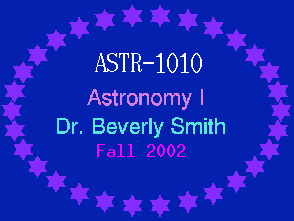Problem 9 is a comparison problem, where one compares two objects.
For this kind of problem, a comparison of
two different objects, the easiest way to
solve the problem is to start by writing down the
relevant equation twice, once for each object.
For this particular problem, the equation in question is
the relationship between theta, the angular size, x, the physical
size, and D, the distance:
theta(A) prop. to x(A)/D(A)
theta(B) prop. to x(B)/D(B)
Then divide the two equations. When you
divide two proportionalities, you can replace
the prop. to signs with equal signs. So then
you get:
theta(A)/theta(B) = (x(A)/D(A))/(x(B)/D(B))
Then simplify. In this case, flip over the fraction in the denominator,
and multiply instead of divide:
theta(A)/theta(B) = (x(A)/D(A)) * (D(B)/x(B))
and simplify further:
theta(A)/theta(B) = x(A)*D(B) / (D(A)*x(B))
Plug in the known values and solve for the unknown.
Where is the ETSU Observatory?
Here are
directions
and a map.
Where is the ETSU Planetarium?
Room 207 (top floor) of Hutcheson Hall.
Here is
a
map.
How can I get extra credit for this course?
There are several ways to get extra credit. There are 11 scheduled
evening labs during the semester, but only 10 are required for full credit--
the 11th is extra credit (or a make-up, if you missed a lab).
In addition, there is an optional take-home lab that can be done
for extra credit (or an additional make-up).
The 6th homework assignment also counts as
extra credit (or a make-up, if you missed an earlier assignment).
In addition, you can earn up to 3 percent extra credit by
class participation, which includes helping with class demonstrations,
speaking up in class, or good attendance.
Finally, you can earn extra credit by attending one
of the two special public astronomy talks during the semester.
These talks will be held
Friday September 27, at 4:30 PM
and Thursday October 3, at 4 PM
in Brown 261 (the regular astronomy classroom).
The first talk will be on the
Deep Impact Spacecraft, by Elizabeth Warner of
the University of Maryland,
while the second talk will be on
the age of the Earth,
by Michael Duffy, from Emory and Henry College.
What are the
pictures
on the Astro 1010 home page?
Click on the
images below and see!













- How can I find the web
pages of various observatories?
Here are some useful
links,
which will connect you to the web pages for various observatories and other
relevant places.
-
What is the format
of the quizzes?
How many questions will they have?
The quizzes will consist of 20
multiple choice questions.
Some of these questions will be
similar to those on the homework,
so make sure you understand
the
answers
to the
homework.
-
I was sick and
missed a quiz. Can I take
a makeup?
Do not worry about missing a single quiz.
The lowest two quiz grades
OR
your grade on the final will be dropped. There will
be NO
individual makeups for the quizzes
or homeworks. Instead, the final is, in a sense,
a general `makeup' for
everyone in the class. If you are sick
and missed a quiz or homework, take it easy
and get healthy, and don't worry about it.
Missing one quiz
will not hurt your grade.
I urge you, however, to take every quiz unless there
is an extreme emergency, in case other unforeseen problems
arise later on in the semester.
-
Do
you have any suggestions that may help me study
for the quizzes?
Review the study guides, the homework problems, the practice
quiz problems, and study the review questions
at the back of each chapter in the book.
Please get in touch with me
if you do not understand something
we have covered in class.
- Can I take the final earlier than the
scheduled time? (or later?)
The final must be taken at the regularly scheduled time.
There will be NO make-ups
or early exams.
Remember, the lowest of either
the lowest
two quiz grades
OR
the
grade on the final will be dropped,
so if you take all of the quizzes, you do not need to take
the final.
I suggest, however,
that you take the final even
if you have
taken all of the quizzes unless you have an A average.
There is always the possibility that by taking the final
you will improve your
grade.
- When is the
final for this course?
The final will be given Tuesday December 10
at 10:30 AM.
MARK THIS DATE AND TIME ON YOUR CALENDAR.
-
Do
you have any suggestions that may help me study
for the final?
One hint
is that the final will cover the same material that was covered in
the quizzes (plus the additional material covered in class after
the last quiz).
In studying for the final, make sure you understand the
answers to the quiz problems, and review
the six study guides and
the homework again. Go over
the problems that you got wrong on the quiz, and make sure you
understand the correct answers. If you are uncertain about the answers to any
quiz problem, get in touch with me.
-
Is the final cumulative?
Yes, it may contain questions on anything we covered during
the entire semester.
-
Because of an emergency,
I missed my lab (or will have to miss my lab).
Can I go to lab
on a different night?
In case of emergency only,
students are sometimes permitted
to attend another lab section. However, the student
MUST ask permission in advance
from both their regular lab instructor and the instructor
of the night they wish to attend. The lab must be handed
in at the end of the lab period to the current instructor.
The observatory building is relatively
small, and gets very crowded. We
cannot allow more than 27 students
at one time in the observatory. If more than 27 show up
for a lab period, the students not officially enrolled in that
lab section will be asked to leave.
Note that, because of differences in the weather, in a given
week, different
lab sections may be doing different labs. Thus, if you attend
a different lab section, you may be out of synch with your regular
lab section, and you may have already done the lab that the other
lab section may be doing.
Before you go, check the
course web page to see what lab is planned for that night.
Note also that, in the case of a cancellation of lab by the University
(because of bad weather, power outage, etc.), only
students who are officially enrolled in the cancelled section
will be excused. Students who are enrolled in other lab sections
who were planning on attending
the cancelled lab section must either attend a different lab that week or
do the take-home lab instead.














